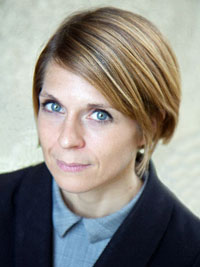Katie Jacob is head of group transformation for BT Business and Public sector, a best in class, in-house consultancy that reports directly into the Group CFO [Chief Financial Officer]. Most recently, she led ‘Project Albion’ – re-shaping the global services (£7bn) and BT business units (£3.5bn) to create two new organisations including bringing in aspects of EE to the BT business unit. Katie’s previous roles include consulting and line finance across multiple big brand organisations including McKinsey, Bupa and KPMG.

“…BT pioneered agile working as early as 2000 – calling it the Workstyle 2000 programme. BT found that absenteeism reduced by 63% when employees worked flexibly…”
‘Agile’ working: More than location and timing
The words agile working have a number of connotations. There are the obvious dimensions of location and timing but for me there are a number of other interesting aspects such as methodology, technology, pace and speed of change.
The rate and pace of change is accelerating, I work for BT as part of Group Transformation (recently re-branded from Cost Transformation given the changing nature of the work we do). My team (led by our M.D., Shahzad Saleem) act as internal consultants for the whole of BT Group.
£2bn of savings and counting
It is an externally recognised and industry leading team, predominantly focused on complex and E2E [end to end] group transformation and delivery, the team has also rolled out Continuous Improvement methodology to over 20,000 BT people. To date the team has delivered over £2bn of savings – we are then investing and creating the oxygen for growth as a business. The team and BT as a whole is a great promoter of diversity including the advancement of women and we have several in senior positions.
BT is not only supporting its own employees but also provides the ability for other companies around the world to help their employees become agile. It is one of the world’s leading communications services companies, delivering one of the fastest fibre broadband roll outs in the world. We provide managed service networks for many of the largest global companies and are the leading provider for voice and broadband services to UK SMEs and consumers. Every day, we touch the lives of millions of people, helping them communicate, do business and be entertained and informed.
For me, it is an interesting time to reflect on agile working and what it means. My job certainly is impacted by the way this is evolving and as a leader within the team, I see part of my role as helping others in the team to be successful in the environment as the changes take place.
How life has changed…

The office I worked in had a small set of computers – these were certainly not portable and we shared these when in the office. If I needed to test the addition on a stock print I would use an adding machine. When I talk to the younger members of my team now – they cannot comprehend what working in that way was like!
Agile pioneers – 63% less absenteeism and 20% more productivity
BT pioneered agile working as early as 2000 – calling it the Workstyle 2000 programme. BT found that absenteeism reduced by 63% when employees worked flexibly. They also found that flexible employees were on average 20% more productive than their office-based counterparts, where productivity was measured using internal business metrics such as absenteeism, sick leave and maternity return rates.
Through this initiative we also reduced CO2 emissions with staff travelling 178 miles per week less, totalling 150,000,000 miles per annum, avoiding the purchase of approximately 12 million litres of fuel per year, resulting in 54,000 tonnes less CO2 being generated in the UK.
Of course technology had a huge role to play in this. Without a laptop that can connect to the BT infrastructure from home, work that can be done and saved ‘soft copy’ and cheap phone technology / teleconferencing – this is just not possible.
Savings that add up…
Teleconferencing has eliminated the annual need for over 300,000 face-to-face meetings at BT, leading to savings of over £38.6 million a year. This has also removed the need for over 1.5 million return journeys saving BT staff the equivalent of 1,800 years commuting and property costs also reduced by 30% (£104m per annum) through the programme, which was designed to reduce the legacy estate through provision of new, modern networked buildings, aligned to the required employee empowered culture of the future organisation
My own experience of agile working
My own experience of this has been fantastic (although probably not the norm). I joined BT just over three years ago – quite some time after the agile working policy was put in place. Within six months of joining we started to expand the work in cost transformation to cover our overseas operations – so a real test for the agile working policy!

I was part of a small team led by Arthur Yu – now CFO of the AMEA (Asia, Middle East and Africa) region who completed this work. I was able to travel across the world (Hong Kong, Singapore, India, Sao Paulo, Paris, Amsterdam etc.) with only minor disruption to my work.
I could access systems, I had security clearance for buildings and I could use my laptop and phone while travelling as well as in the offices. All of this meant I could focus on the people I was working with and the content of the work rather than more administrative tasks. The programme of work was incredibly successful overall saved hundreds of millions for BT over its course and is still running today.
My reflection on location and timing is that if anything this will only get easier as time progresses. Technology is improving all the time, for example Dolby sound quality is now available on our teleconferencing – you could almost be in the same room! And I am sure that there will be many different and amazing developments that further support this.
Delivering more for customers by changing the way we work
So what about the nature of the work itself? For me, this is a more complex issue to consider and where I need to spend more of my time as a leader so that my team and the business can be as successful as possible. Customers want more, they want more tailored and personal solutions and they want them faster. Pace has changed and the amount of information / number of sources of that information that we can access has also increased.
This means we have to change the way we work. The reason this is interesting is that it requires more psychological flexibility from people. Flexibility on location and timing of work have existed for a comparatively long time and we all have had time to process and accept. The pace of change in terms of what we do / how we do it / how fast we iterate is newer. For me, that means that this is something to focus on as we try and get the best from our teams.
Psychological flexibility
Kashdan and Rotterburg (2010) define psychological flexibility as the measure of how a person: (1) adapts to fluctuating situational demands, (2) reconfigures mental resources, (3) shifts perspective, and (4) balances competing desires, needs, and life domains. Items 1-4 are certainly key characteristics that I look for in team members as they are a critical factor for success and enjoyment of the work that we do.
Historically change programmes have been designed in quite a linear way. You were able to sign off a recommendation, build an implementation plan and then tick off the milestones as they occur.
In Group Transformation at BT we originally only had team members who completed ‘discovery’ work – this means the design of new change. Due to the increasing complexity and requirement for agility we now have multiple additional areas:
- Implementation – focus on execution and programme management;
- Big data analytics – focus on big data modelling, merging of complex data sources, automation and process software robotics;
- Revenue assurance – identification of leakage, implementation of controls and improving new products;
- Continuous improvement – holistic focus on cost, service and engagement and coaching and training operational teams.
The interesting part is the ability to work across the different disciplines to get the most agile / best solution for the business problem. Taking the experience, skills and insights from across the different areas. For the team it is an exciting time as their roles are more dynamic and more blended than ever before.
As a member of the team myself, my reflection is that this is a great place to be – I am able to learn and try new ways of working and thinking all the time – the boundaries of my role are more flexible and I can adapt to new work. I know BT is not unique in this.
Leaders supporting teams in different ways to drive better customer experience
As a leader, my reflection is that we have to support our teams in different ways – we have to set expectations for them about the work in a different way: we have to help them develop flexible thinking and coach them to avoid getting stuck, we have to encourage multi-disciplinary working and provide the channels to make communications across teams easier and we ourselves have to accept that the goals we set for them may need to change as we find out more about the programme of work / as things develop over time.
It is quite a challenge but if we can be successful in this – we can drive better customer experience and better business performance as well as ensuring that our teams feel fulfilled by the work that they do.
Helping our people to succeed through connectedness
To close, I have one final reflection which runs a little counter to the other observations I have made. Work and business are essentially about people and so to have success in business and for our customers – our people must be successful.
As the location, timing, pace, content all become more flexible there will need to be some counters, we need to have a core thread that puts what we do into a frame giving us consistency and an overall direction and I find that most people like to feel like part of a team.
In the Group Transformation team, we work hard to give each person a feeling of connectedness – through their relationship with the line manager, through performance dialogues, through team events etc. – recognising that this can be one of the major drivers of success for the individual. As the team grows, this becomes more difficult to achieve and is therefore a significant measure of success as a leadership team if we are driving this through.
In conclusion, agile working is a huge opportunity – one that will continue to evolve at a faster and faster pace. It will give greater opportunity for personal actualisation and enjoyment of work but as leaders we must strive to support our teams in different ways and recognise that for some this new flexibility will require some time and effort from us to result in enjoyment of their roles.
If you are interested in working for the Group Transformation team at BT you can also read our recruitment brochure here. Please contact any of my colleagues below if you would like further details. They would love to hear from you:
Selena Davies selena.davies@bt.com
Victoria Cookson victoria.cookson@bt.com
Eser Rizaoglu eser.rizaoglu@bt.com






